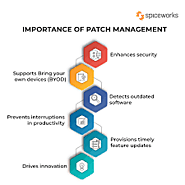-
About
- About Listly
- Community & Support
- Howto
- Chrome Extension
- Bookmarklet
- WordPress Plugin
- Listly Premium
- Privacy
- Terms
- DMCA Copyright
- © 2010-2024 Boomy Labs

 Joe Brooks
Joe Brooks
Listly by Joe Brooks
In today's digital age, e-commerce has become an integral part of our daily lives. From buying clothes and electronics to ordering groceries and booking travel, online shopping offers convenience and accessibility. However, with the increasing number of online transactions, the risk of cyber threats and data breaches also rises. Ensuring robust cybersecurity is crucial for e-commerce businesses to protect customer data and foster trust in their online platforms.
Source: https://www.thomasnet.com/insights/ecommerce-cybersecurity/

A robust website infrastructure is the foundation of secure e-commerce. Employing Secure Socket Layer (SSL) certificates is essential to encrypt data transmitted between the customer's browser and the server, ensuring sensitive information, such as credit card details, remains protected from prying eyes. Regular security audits and vulnerability assessments can help identify weaknesses in the system and address potential threats proactively.

Encourage your customers to create strong passwords and implement password policies that require a combination of uppercase and lowercase letters, numbers, and special characters. Additionally, consider offering multi-factor authentication (MFA) to add an extra layer of security. MFA requires users to provide a second form of authentication, such as a one-time code sent to their mobile device, in addition to their password.

E-commerce businesses that process, store, or transmit credit card information must comply with the Payment Card Industry Data Security Standard (PCI DSS). PCI DSS sets specific requirements for handling cardholder data, including encryption, access controls, and regular security testing. Compliance with PCI DSS not only protects customer data but also instills confidence in your customers that their financial information is in safe hands.

E-commerce platforms and associated software should be kept up-to-date with the latest security patches. Cybercriminals often exploit known vulnerabilities in outdated software to gain unauthorized access. Establish a robust patch management process to ensure that security updates are promptly applied to all systems and software.

Choose reputable and secure payment gateways for processing online transactions. These gateways should comply with industry security standards and be certified by recognized security authorities. Avoid storing customer payment information on your servers, and instead, utilize tokenization or other secure methods to handle sensitive data.

Data encryption is a critical component of data protection in e-commerce. Ensure that all sensitive data, including customer information and payment details, are encrypted both in transit and at rest. Encryption scrambles the data, making it unreadable to unauthorized individuals even if they manage to access it.

Human error remains one of the most significant risks in cybersecurity. Conduct regular security awareness training for all employees, emphasizing the importance of identifying phishing attempts, protecting login credentials, and adhering to security protocols. Employees should also be aware of the potential social engineering tactics used by cybercriminals to trick them into revealing sensitive information.
